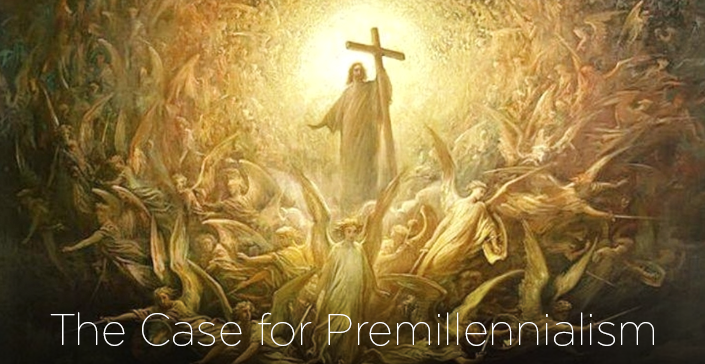
Premillennialism teaches that Jesus will physically return to the earth where He will reign for a literal one thousand year period. The major contrasting view is called amillennialism, which holds the view that the church itself fulfills all the Old Testament promises about a future age of peace. “Millennial” comes from the Latin meaning one thousand. The prefix “pre” means “before” and the prefix “a” means “no.”
This paper looks at three of several lines of support for a millennial rule in which Christ reigns over the empire of this world from David’s throne in Jerusalem.
• A literal interpretation of Revelation 20:1-10 demands a one thousand year period in which Satan is bound and Christ rules the Messianic Kingdom and.
Even though this is the only chapter in the Bible that mentions one thousand years, the term is referred to six times here. The book of the Revelation uses many symbols, but time designations are never used symbolically.
Rev. 20 is important because it shows the length of time of the Messianic Kingdom. But premillennialism is not a one text doctrine. Other passages describe it as well.
PSALM 72 describes Messiah ruling over the earth.
ZECHARIAH 14 tells us that the Lord will be “King over all the earth” from the time His feet stand on the Mount of Olives.
ISAIAH 65 speaks of extremely long life, such as we don’t experience today.
ACTS 1:6 speaks of a furture restoration of the kingdom to Israel.
REV. 5:10 predicts that twenty-four elders will be in some way kings and priests of our God, reigning on earth.
ISA. 24:21-23 predicts that the kings of the earth will be punished when the Lord of hosts reigns in Jerusalem.
Other passages speak of this time period as well. This time, which we call the millennium, is different from this present age and different from the eternal state.
• The biblical covenants support the premillennial view.
God makes a series of covenants with His people. A covenant is a contract or an agreement. It may be two-sided (conditional) or one-sided (unconditional). Two of God’s unconditional covenants deal with the subject of premillennialism.
THE ABRAHAMIC COVENANT
God covenanted a land and a seed to Abraham. The covenant is called “eternal” (Gen. 17:13; Gen. 17:19; 1 Chron. 16:16,17; Psa. 105:9,10). Part of the Abrahamic covenant states that the land would continue as Abraham’s descendants eternal possession (Gen. 17:8). The Lord acted out a one sided ritual to inaugurate the covenant, indicating that He would carry out the responsibility for its fulfilment, independent of man’s doings.
The covenant is repeated to Abraham, even after seasons of disobedience on Abraham’s part.
– Abraham forsook the promised land to go to Egypt, where he put the mother of the promised seed in jeopardy to the Pharoah (Gen. 12). Nevertheless, God confirmed the covenant to Abraham (Gen. 15).
– Abraham faltered in his faith and produced a son by Hagar, once again ignoring the role that Sarah was to play (Gen. 16). Again God reaffirmed His covenant (Gen. 17).
– Abraham erred again with Abimelech of Gerar (near the Gaza strip today). He repeated a similar action regarding Sarah, as he had with Pharoah (Gen 20). Nevertheless, God restated His covenant (Gen. 22).
THE DAVIDIC COVENANT
The promises of the Davidic Covenant support the premillennial view. God had promised that his house and his kingdom would be established forever (2 Sam. 7:12-16). Gabriel announced to Mary that her child would fulill the promise to David, that He would rule David’s kingdom forever.
The Messiah will reign over Israel from His capital in Jerusalem. His rule will reach from from the river of Egypt to the great river, the Euphrates—(Gen. 15:18).
Israel will reign over a worldwide empire. We know how various empires have ruled over other nations, such as Egypt, Babylon, Persia, Greece, or Rome. Christ’s kingdom will be a world-wide empire, but He will have no fear of rebellion, as occurred with the other empires.
Some have attempted to see Solomon as the fulfillment of this promise. But Solomon had no permanent possession of the land. He collected tribute only; he had a temporary lordship. He never reallly reigned from the river of Egypt to the Euphrates. Hundreds of years after Solomon’s time, Scriptures abound in promises of israel’s future possession of land.
• Romans 11 indicates that God has yet a purpose for His people.
Paul raises the question, “Has God cast away His people?” i.e. the Jews.
His emphatic answer is “Certainly not.(Romans 11:1)” He argues that in every age God has had a loyal remnant. In this age the church has been grafted into Israel. But this does not mean that God is finished with Israel as a national entity. Contrary to the view that the church has replaced Israel because of its unbelief, God declares He has a plan for His people.
As Paul draws that core section of Romans in chapters 9-11 to a conclusion, he states of Israel, “Concerning the gospel they are enemies for your sake, but concerning the election they are beloved for the sake of the fathers (Romans 11:28).” Though presently in a state of alienation from God, the Jewish people are in a covenant relation with God because of the Fathers. The Fathers were Abraham, Isaac and Jacob. God made promises to them that He must fulfill.
When the Deliverer comes out of Zion, all Israel will be saved (Rom. 11:26).
The gifts and the calling of God are without repentance; therefore, they are sure and irrevocable Romans 11:29). They will come to pass.
Revelation 20 speaks of a specific one thousand years for the Messianic Kingdom. Jesus Christ’s coming will establish this kingdom. The Abrahamic Covenant anticipates a land for Israel and a seed. The Davidic Covenant tells us that the seed is the Messiah. Romans 11 tells us emphatically that God will fullfill His covenant promises to Israel.
The day is coming when the Messiah will reign from Mt. Zion in Jerusalem (Psalm 2:6-9) over the nations of the earth (Psa. 22:27-31). Jerusalem will be the hub of the earth and wars will have ceased. The world will recognize The King.






